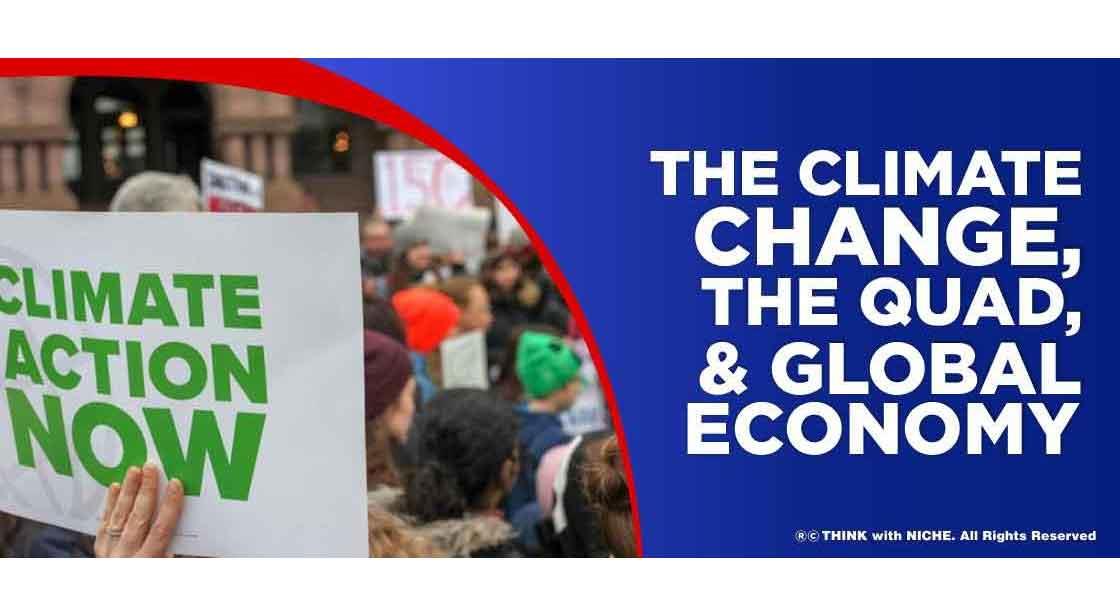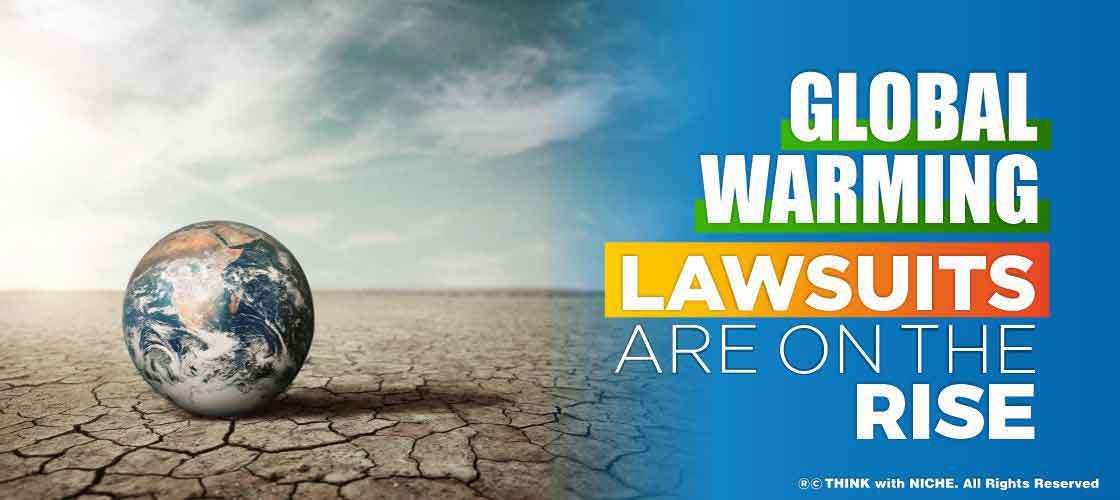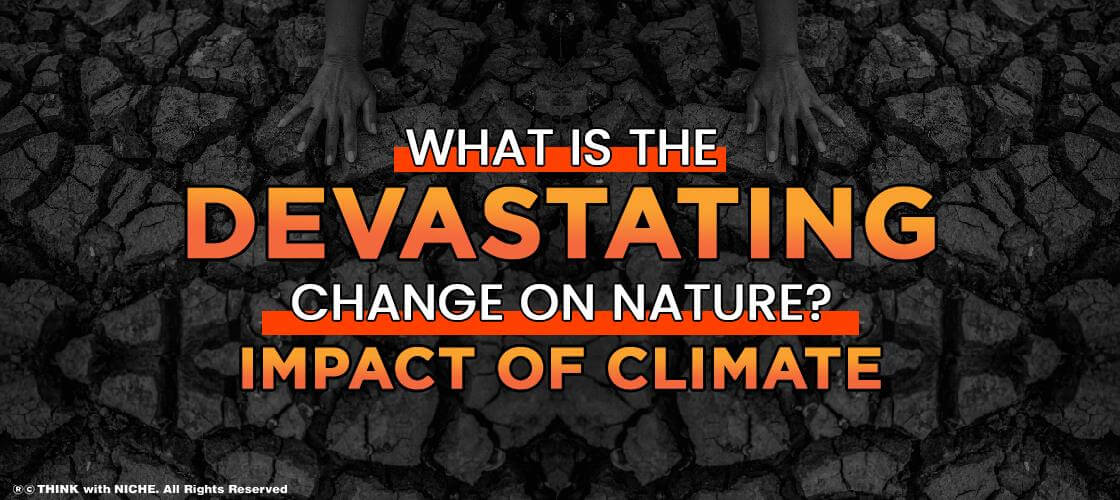The Climate Change, The Quad, And Global Economy

Blog Post
Countries cannot afford to rely on fossil fuels for electricity generation in a scenario where population growth leads to increased energy consumption. Natural resources are depleted, input costs are high, and emissions are often unregulated. At a time when the globe is experiencing catastrophic disasters such as floods caused by unseasonal rainfall, forest fires, and biodiversity loss, the use of renewable energy is critical. ThinkWithNiche writes on how The Quad and the initiatives to work on Climate Action and Environmental Issues are significant for the world and the global economy. #TWN
The Quad Countries Initiative
After 20 months of living with a pandemic and the constant fear of new varieties, the world is treading carefully on the route forward. Many economies and enterprises are regaining momentum as a result of increased vaccination coverage. In the face of continued uncertainty, multilateral organizations of countries are taking on new duties. The Quad, which was founded in reaction to a natural disaster, the tsunami of 2004, is now focusing its efforts on a new crisis: the pandemic. The Quad countries are working together to save the globe from environmental damage. Given the world's current climate issue, advancement must be sustainable in addition to economic development.
ThinkWithNiche writes on how The Quad and the initiatives to work on Climate Action and Environmental Issues are significant for the world and the global economy.
Countries cannot afford to rely on fossil fuels for electricity generation in a scenario where population growth leads to increased energy consumption. Natural resources are depleted, input costs are high, and emissions are often unregulated. At a time when the globe is experiencing catastrophic disasters such as floods caused by unseasonal rainfall, forest fires, and biodiversity loss, the use of renewable energy is critical. In technology, industry, and finance, the Quad can help to achieve an inclusive energy transition. India is in a good position to supply the manufacturing infrastructure needed to develop these technologies. To supplant China as the "world's factory," it will need to replicate China's advantages of large-scale production at low costs. If this is accomplished properly, it will contribute to the creation of much-needed jobs in the country. Energy transformation, like many other large long-term endeavors, requires adequate funding. The Quad's wealthier nations have a role and a chance to help developing countries transition to more sustainable energy sources by driving capital investments. To support globally interconnected grids, for example, "climate finance" is required.
Climate Change Problem
The climatic problem necessitates an immediate response. Quad nations are already driving their efforts toward climate ambition, including working on 2030 objectives for national emissions and renewable energy, clean-energy innovation, and deployment, with a focus on adaptation, resilience, and preparation. Their focus on boosting the Indo-Pacific region's resilience to climate change by improving key climate information-sharing and disaster-resilient infrastructure is the most laudable commitment. Plans such as the Coalition for Disaster Resilient Infrastructure's construction of a new technical facility to provide technical help to small island developing governments and the development of a Climate and Information Services Task
Force is positive steps. However, to guarantee that a real difference is made on the ground, these will need to be constantly monitored and reviewed. The tremendous expenditure that will be made from now until 2050 to achieve the 1.5°C goals demonstrates the magnitude of the task at hand. In the Quad vaccination cooperation, nations have already demonstrated a strong commitment to improving equitable access to safe and effective vaccines in the region and around the world. In the areas of energy and climate action, a similar level of commitment is required. Delays in reducing carbon dioxide or other short-lived climatic pollutants will have negative and potentially permanent effects on global warming, sea-level rise, food security, and public health. Reduced short-lived climate pollutants, which have a relatively short lifetime in the atmosphere spanning from a few days to a few decades, can help to quickly lower the rate of global temperature rise, complementing efforts to reduce carbon dioxide emissions and keeping warming below 2°C.
By 2030, the Climate and Clean Air Coalition's policies may reduce methane emissions by at least 40% and black carbon emissions by up to 70%, and by 2050, high-global warming potential hydrofluorocarbons could be practically eliminated (99.5%). (all compared to 2010 levels). By 2050, widespread initiatives to minimize short-lived climate pollutants could save 0.6 degrees Celsius of warming. Cutting carbon dioxide and other short-lived climate pollutants is crucial for slowing global warming and meeting the Paris Agreement's 2°C objectives. According to the Intergovernmental Panel on Climate Change (IPCC), routes to limit global warming to 1.5 degrees Celsius must entail significant reductions in all climate forcing emissions, including short-lived climate pollutants. Warmer temperatures exacerbate public health issues such as heat-related illnesses, an increase in vector-borne infections, and a reduction in access to safe drinking water and food. Reduced emissions of short-lived climate pollutants can help to decrease global warming and reduce public health hazards.
Temperatures are rising, posing a threat to food security. Food availability is being reduced due to an increase in pests and illnesses, as well as more frequent and harsh droughts and floods. Heat stress results in low yields or, in the worst-case scenario, crop collapse. We have the best chance of limiting global temperature rise and reducing food security problems by reducing short-lived climate pollutants. The key staple crops, wheat, rice, maize, and soybeans, suffer annual losses of roughly 110 million tonnes due to tropospheric ozone. This accounts for about 4% of total global crop production each year, and up to 15% in some locations. Reducing methane, a component of tropospheric ozone generation could cut these losses in half by 2050, saving between $4 and $33 billion per year. Short-lived climatic pollutants have economic ramifications for human health, ecosystems, and agricultural productivity. Reducing short-lived climate pollutants can result in immediate economic benefits such as increased household income and job creation, as well as long-term benefits such as enhanced public health, reduce poverty and inequality, and reduced climate change consequences.
The Quad countries are strategically positioned to have an impact not just on their own problems, but also on those of the entire planet, through concentrated efforts and concrete solutions. It is now up to them to pave the way for a truly sustainable future.
If you enjoyed reading this informative article, we have two more for you on a similar theme. Click on the link below to explore!

Global Warming Lawsuits are on the Rise

What Is The Devastating Impact Of Climate Change On Nature?
You May Like
EDITOR’S CHOICE












